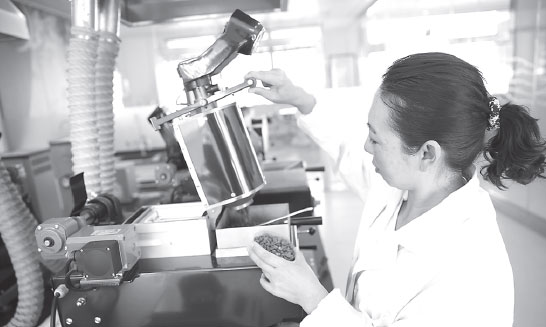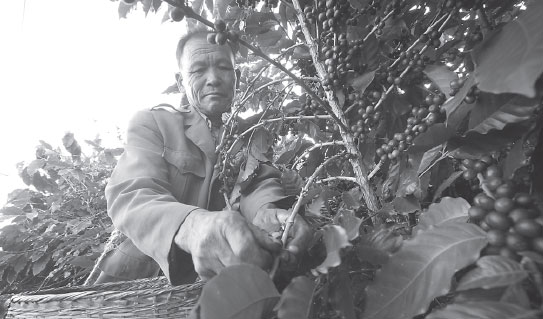Nestle savoring Yunnan coffee market boom as demand rises
Pu'er, where one of the most famous Chinese tea varieties grows, is now gradually expanding into Arabica beans and building itself into China's coffee capital.
Having only been introduced to the land around 100 years ago, coffee is generally considered a foreign drink in China. It is usually associated with Western brands such as Starbucks, Costa Coffee, Dunkin' Donuts and Nestle sachets.
But to many people's surprise, Yunnan province in Southwest China has been slowly building up its coffee bean empire since the 1980s. It has become a rising bean supplier in both the domestic and international markets.
According to Nestle, one of the world's biggest coffee producers, Yunnan is now able to supply all the coffee products in the Chinese market, including soluble coffee drinks and Nespresso capsules, with its high-quality Arabica beans.
"Arabica is a refined bean and very difficult to grow. It only grows in mountain areas and in last 30 years Yunnan has built a very good profile," said Reinhold Jakobi, managing director of Nestle Food and Beverage, Greater China Region. "There is a very specific taste to the coffee. It's more delicate and refreshing."

The arrival of foreign capital has significantly helped and developed Yunnan's coffee industry. From the untamed wilderness to the newly launched coffee center, Jakobi has witnessed the growth of Yunnan's bean business.
"Thirty years ago there was no coffee. We spent lots of money when there was nothing. But the coffee market is growing and at Nestle, our philosophy is that we need to be able to source our raw material. It's the same with our dairy base in North China," said Jakobi. "We need a functioning rural environment and sustainable agriculture."
Since 1980, Nestle has been training local farmers in Yunnan in how to grow coffee and buying the beans from them.
"We have daily prices at which to buy the beans and the farmers can decide if they want to sell it to us," said Jakobi.
Although coffee consumption remains low compared with traditional tea drinking, it is growing into a lucrative business. The China Market Research Group forecasts that domestic coffee consumption will grow by 20 percent every year.
Shaun Rein, managing director of the research group, said to the BBC in a previous interview that young women were the main reason for the blossoming market.
"They are moving away from buying Louis Vuitton bags to experiences, and coffee culture is a part of that." Rising demand has brought Yunnan a promising economic future and the chance to elbow its way into the coffee market, mainly occupied by established cofee producers such as Ethiopia, Vietnam and Brazil.
"We made a new coffee capsule from Yunnan Arabica beans for our Dolce Gusto coffee machine. It hasn't been on the market for long, but so far 70 countries where we sell the capsules are happy with it," said Jakobi.
Dolce Gusto is a capsule coffee machine particularly marketed to the younger generation.
According to the United States Department of Agriculture, Chinese coffee consumption has almost tripled since 2012. Some are worried that the vast market and potential profits will lead to massive over-planting of coffee, regardless of any environmental limitations.
But Nestle, which has more than 4,000 coffee farmers in Yunnan, is not worried. Jakobi explained: "At Nestle we believe in creating shared value. Therefore, we not only make farmers happy, but also companies, consumers and the environment. We only buy sustainably-grown, top-quality beans with better prices, therefore we will have better beans that are better for the environment."
Beijing Music Festival a sweet treat
Beijing music lovers enjoyed a feast of timeless masterpieces and explored multimedia art forms, brought by the 19th Beijing Music Festival, under Nestle's sponsorship.
The BMF, one of the capital's stellar events, took place in October to give autumn a golden finale. The annual festival has been held for 19 years. This year's theme was "in conversation between the classic and the modern age" and "how to give timeless works a new vitality in the 21st century".
Jonathan Dong, vice-president of corporate affairs at Nestle, which has sponsored BMF for 17 years, spoke highly of the event.
"The musical event promotes the classical arts, and in doing so, also promotes a lifestyle of mental well-being," said Dong.
This autumn, the BMF delivered 30 shows from Oct 9 to 29, spanning opera, orchestral and folk music, as well as crossover events.
It also paid special tribute to William Shakespeare for the 400th anniversary of his death with a magical evening of opera A Midsummer Night's Dream with British composer Benjamin Britten.
Rashid Qureshi, CEO of Nestle, Greater China Region, expressed his excitement: "Congratulations to the successful performance of A Midsummer Night's Dream. BMF has become a very well-known brand internationally, and Nestle is very glad to join BMF by being the sponsor since 2000."
In order to bring the most original performances to Chinese audiences, the BMF has invited the current British music director of the Vancouver Opera, Jonathan Darlington, to be director, and original cast members from last year's performance in Aix-en-Provence Festival. The orchestra for the event was the China Philharmonic Orchestra.
Rashid added that the BMF has presented quality, innovation, culture and tradition, which echoed with the value "good food, good life" that Nestle follows for food and beverage.
"This year is also the 150th anniversary of Nestle. We are very proud to be able to present the timeless art of Shakespeare to the Chinese audience," said Rashid.
renxiaojin@chinadaily.com.cn
|
A technician at the Nestle Coffee Center in Pu'er, Yunnan province, tests coffee quality. Photos Provided To China Daily |
|
A farmer in Pu'er picks cofee beans, which Nestle uses as a raw material. |
(China Daily 12/29/2016 page14)
















